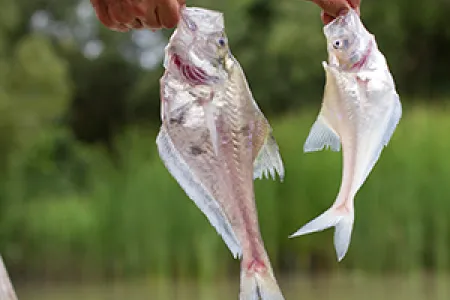Male fish takes ‘child’ rearing to a new level
Protecting offspring is the job of many fathers in the animal kingdom, but one species of fish found in a crocodile-rich river in the Northern Territory has developed a unique adaptation to ensure it keeps an eye on its young at all times.
Charles Darwin University Professorial Fellow Tim Berra has been studying the nurseryfish in the Adelaide River for more than 15 years, returning to the NT eight times to find out more about these hatchet-shaped living jewels and their bizarre characteristics.
With Father’s Day approaching, Professor Berra hopes to raise awareness of these fishy fathers and their unique adaptation for carrying their eggs.
“They are very politically correct by doing their share of child-rearing,” Professor Berra said.
He said that while the female nurseryfish (Kurtus gulliveri) has a small hump on the top of the forehead, the male has a significant hook-like protrusion.
“The egg mass is composed of thousands of eggs connected by filaments and the male carries this bundle on his hook like a bunch of grapes,” he said.
Professor Berra said he was still trying to determine how the eggs became attached to the hook and whether the male fish was a genetic match with the embryos.
“DNA analysis has revealed very low genetic variation within the nurseryfish population, which makes it difficult to say with certainty that any given male is the genetic father of the embryos within the egg mass,” Professor Berra said. “However, we strongly suspect that the male carrying the egg mass is the father of those embryos.”
Professor Berra said it was likely that the egg-carrying was an adaptation to protect the eggs from tidal flow and siltation, and enabled the male to move the eggs to a safe location.
“During this visit to the NT I am towing a plankton net the length of the river to try to pin down where the larvae are and, therefore, where the adults are spawning,” he said. “So far I think it is related to salinity.”
Professor Berra is a world-renowned Charles Darwin specialist, authoring several books on the legendary naturalist including “Darwin and His Children: His Other Legacy”.
“Charles Darwin can be considered the poster child of a good father as exemplified by the lives of his 10 children with his first cousin, Emma Wedgwood Darwin,” he said.
“Three of the children were Fellows of the Royal Society and were knighted and most of his children who survived in to adulthood made significant contributions to society.”
